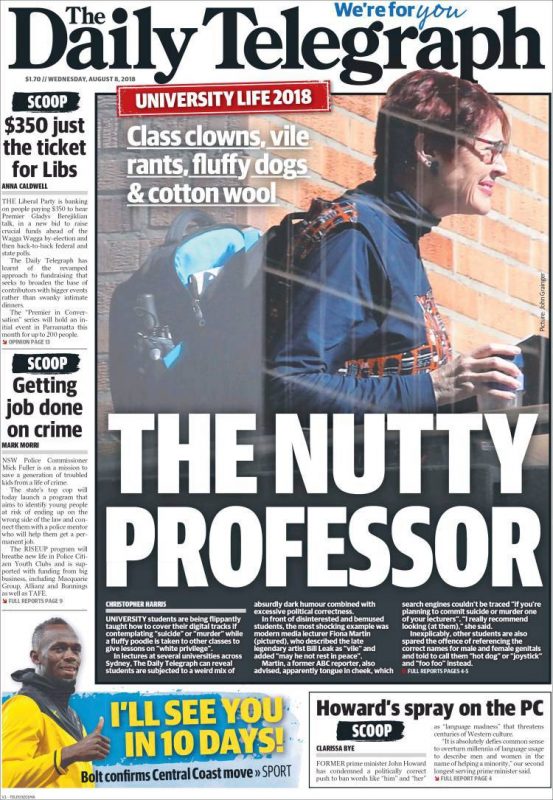
Press Council rules The Daily Telegraph did not cross the line with ‘nutty professor’ gag
The Press Council has ruled that The Daily Telegraph did not cross the line in its reporting on Dr Fiona Martin. Martin lodged the complaint regarding three articles, one of which was headed ‘The Nutty Professor’.
The story was run on the front page of the Telegraph on August 8, along with a full report on pages four and five, titled ‘Degrees of Hilarity’ and ‘Bizarre rants of a class clown’. Another story was headlined ‘Sydney University lecturer shocks students with internet search advice on ‘committing suicide’.
The stories claimed students in universities across Sydney were being subjected to ‘dark humour’ and ‘excessive political correctness’, naming media lecturer Martin as one of the examples. The story included a photo of Martin with the picture titled ‘The Nutty Professor’.

Martin lodged a complaint about the reporting, alleging that the headline ‘The Nutty Professor’ inaccurately referred to her as a professor and also implied she had a mental illness. She also claimed there were numerous other inaccuracies in the reporting, including misrepresentation of her comments about cartoonist Bill Leak.
Martin also said she was not given a right of reply about the comments, despite writing to the publication to request such.
The Telegraph responded by claiming that the reference ‘The Nutty Professor’ was a play on words related to widely known films of the same name. The publication stated that it had referred to Martin as ‘Dr Martin’ throughout the rest of the articles.
The Telegraph said Martin was given a right of reply, but that she chose to respond to selected questions only.
In response to the complaint, the Press Council stated that readers would recognise ‘The Nutty Professor’ as a reference rather than assuming it referred to mental illness. As the Telegraph used Martin’s title throughout the article, the Council thought readers would not be misled by her title.
The Council was not satisfied that the articles were misleading or inaccurate, and considered that although the Telegraph misrepresented her comments about Bill Leak, that his cartoon was ‘vile’ not he himself, the fact she went on to say ‘may he not rest in peace’ was enough to suggest her comments reflected her opinion of him as a whole. Accordingly, there was no breach of General Principles.
The Council was also satisfied that the Telegraph gave Martin adequate opportunity to respond. Again, this meant there was no breach of General Principles.
This isn’t the first time the Press Council has had to rule on the Daily Telegraph, with the Council finding last year that a Telegraph story on “politically correct vandals” was not supported by factual evidence.



I’m writing a movie script … The Shitty Headline Writer.
This is the kind of exercise to which we have descended. Today, many people seem poised to strike at the next opportunity to be offended.
The headline, just like the article it heads, is lame and slightly mindless in my opinion, but the reply and the subsequent attention given is nothing short of futile.
Professors (imagined) have been traditionally Germanic ( age of enlightenment) and absent-minded ( supposed of those who think above the mundane) for many years, and well before our own time.
Rather than an opportunity to be offended, this whole episode was an invitation to laugh at both the reporters and oneself.